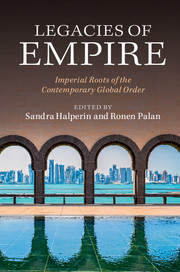Book contents
- Frontmatter
- Contents
- List of figures
- List of tables
- List of contributors
- Acknowledgments
- 1 Introduction: legacies of empire
- Part I Incomplete transitions from empires to nation states
- Part II Legacies of non-European empires in today's world
- Part III The future legacies of the American Empire
- 8 Foreign bases, sovereignty and nation building after empire: the United States in comparative perspective
- 9 Empire, capital and a legacy of endogenous multiculturalism
- 10 The assemblage of American imperium: hybrid power, world war and world government(ality) in the twenty-first century
- 11 Conclusions
- Index
- References
8 - Foreign bases, sovereignty and nation building after empire: the United States in comparative perspective
from Part III - The future legacies of the American Empire
Published online by Cambridge University Press: 05 August 2015
- Frontmatter
- Contents
- List of figures
- List of tables
- List of contributors
- Acknowledgments
- 1 Introduction: legacies of empire
- Part I Incomplete transitions from empires to nation states
- Part II Legacies of non-European empires in today's world
- Part III The future legacies of the American Empire
- 8 Foreign bases, sovereignty and nation building after empire: the United States in comparative perspective
- 9 Empire, capital and a legacy of endogenous multiculturalism
- 10 The assemblage of American imperium: hybrid power, world war and world government(ality) in the twenty-first century
- 11 Conclusions
- Index
- References
Summary
Introduction
Commentators and scholars routinely refer to the vast global network of US military bases and security installations as a contemporary American ‘empire’. They view American commanders as modern proconsuls, make comparisons to Roman military power, express concerns about the militarization of US foreign policy and draw attention to US interference in the domestic affairs of its base hosts (Kinzer 2006). But viewing the US basing network as an actual modern imperial system poses significant theoretical challenges. As Christopher Sandars suggests, since World War II the governing arrangements of US overseas military facilities have resembled more of an informal or ‘leasehold empire’, relying on the legal consent of hosts, security contracts and quid pro quo to maintain the American presence (Sandars 2000). Further, with some important exceptions, the United States in the Cold War and post-Cold War era has not exercised the degree of political control over its base hosts as a colonial power would, rendering it vulnerable to unilateral renegotiations, growing domestic political opposition, exit threats and even evictions from base hosts.
There is, however, a more fundamental and formal connection between US empire and the overseas military basing presence that is often neglected in the so-called American empire debate: many of the USA's most important overseas basing relationships are themselves imperial legacies, legally originating in the transition of an overseas base host from an imperial periphery or occupied polity to an independent, nominally sovereign state.
- Type
- Chapter
- Information
- Legacies of EmpireImperial Roots of the Contemporary Global Order, pp. 173 - 196Publisher: Cambridge University PressPrint publication year: 2015



